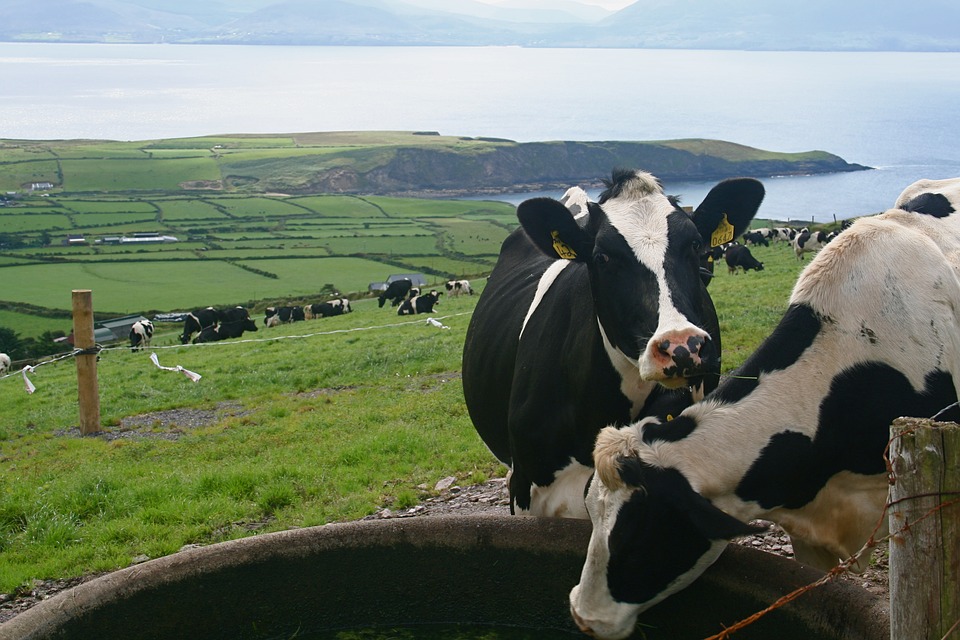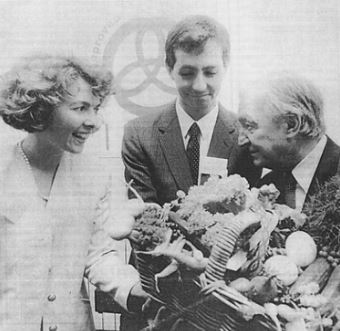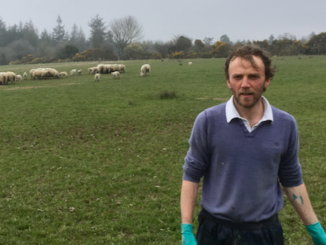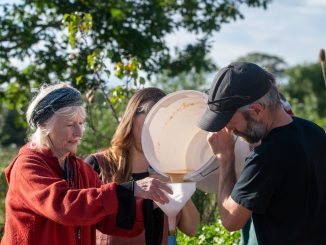
Like most EU Member States, Ireland periodically develops an action plan for its organic sector. There, a team of stakeholders, drawn from the conventional and organic sectors, as well as representatives of the Irish state’s Department of Agriculture, have developed the Organic Action Plan for Ireland, 2019-2025. Ireland has among the very lowest number of organic farmers, and organic land area, in European organics. So what difference will this plan make?
Beef, diary and tillage appear to be the big winners in the Organic Action Plan 2019 to 2025.
For beef the plan aims to “increase organic cattle production from 0.8% of total cattle in 2016 to 1.6%.”For tillage, “the aim is to increase the area under organic cereals and pulses from 2,426 hectares in 2017 to 5,000 hectares.” Dairy is set to see a 10% annual increase, totaling 60% between now and 2025.
Other sectors see more modest proposals. Horticulture area is set to increase about 25% 44% from 524 ha to 750; for sheep meat, the aim is simply to find a market for what’s currently produced in the organic system. Aquaculture will see growth from 20000 to 26000 tonnes.
There are no growth figures given for poultry/eggs, notwithstanding the fact that there are 96,000 organic layers and 22,000 organic broilers in Ireland.
The plan is the work of the Organic Sector Strategy Group established in March 2018, drawn from leading figures in the organic and conventional sectors, the organic control bodies and farmer organisations, as well as the state agencies of Teagasc and the Department’s organic unit.
The group was tasked with reviewing the previous plan, assessing the case for re-opening the Organic Farming Scheme (OFS) and, most importantly, “to draft a new 5-7 year Strategic plan for the development of the organic sector, including sectoral and cross sectoral recommendations, market developments, training and education, public awareness and wider EU policy.”
It is noteworthy that post 2020 the aim is to “apply selection criteria to OFS application process annually and limit to a fixed annual budget to increase potential for scheme to open more frequently over RDP period.”
This goes some way to addressing the fact that the OFS has been closed far more often than it’s been opened in recent years.
The report states: “the group considered that there is sufficient justification to reopen the OFS from 2019, targeted at areas for which there is a clear market demand and which are critical to the further development of the organic sector namely horticulture, cereals and dairy.”
Post 2020 “the inclusion of an Organic Farming Scheme in a new Rural Development Programme was considered essential to stimulate and support increased organic food production”
To achieve this “the need for higher conversion payments in the case of dairy and tillage was highlighted.” The report adds: “Market research on the current requirements for animal feed indicates that there is requirement in the region of 23,000 tonnes annually excluding aquaculture.”
For dairy, the two year conversion period is emphasised as an area where payment rates should be higher, to encourage entrants.
Horticulture makes up 34% of the organic market, yet there is a 70% rate of imports in this sector. Again, payment increases are suggested: “the payment rate should be significantly further enhanced for small scale horticulture producers.”
There was discussion on a “tapering off” of a higher rate over five years vs the current system of two years conversion three years maintenance. However, with CAP and RDP uncertainty, no decision was put forward on this until more clarity becomes available.
“In any event it was suggested that selection criteria should be applied annually, and the OFS application process limited to a fixed annual budget to avoid all monies being consumed in the first year of the programming period and to enable the Scheme to be open more frequently over the lifetime of the RDP” the report adds.
There was also a recommendation for the establishment of an implementation group to carry out the strategy.
Read or download Ireland’s Organic Action Plan 2019-2025
Analysis
First, the good news:
· Having a plan is better than not having one, and it helps with EU institutional relations, drawing down supports and so on.
· It’s good that the plan forecasts growth in most sectors (tillage, beef, diary, horticulture, aquaculture and poultry). Moreover, the emphasis on opening the organic farming scheme (OFS) in a more steady and regular fashion is to be welcomed. The 2018-2019 opening of the OFS was for a very short window over the Christmas period, with a very small amount of finance allocated to it.
Also welcome:
· Dairy discussion group establishment.
· Some extra farm walks in specific named areas (e.g. fruit).
· “Incorporate organic horticulture into Teagasc apprenticeship programme” and this is committed, specific language. It will require dedicated organic specialist staff however.
· “Create a multi-annual marketing strategy” is both interesting, and worrying: why is this not already happening? Why “create” it?
· “Finalisation and publication of a Value Chain Analysis focusing on the production of supply statistics by sub-sector. Supply statistics to be updated regularly”.
That this stems from a named problem in the report is especially encouraging: the report points out that retail market increases do not show “how much of this was accounted for by Irish organic production” and this inhibits proper assessment of progress. ..” the Group recommended therefore that “work on identification and compilation of more reliable production statistics, value chain analysis and identification of specific market opportunities for Irish organic food products needs to be progressed”
Unfortunately, this is a rare example of committed language.
Instead, as was the case with previous OAPs, we have vague language and few methods to achieve targets: “examine the possibility”; “encourage”; “promote” “to be considered”; “explore potential”. This language commits no one to anything.
A really good idea “protein payment for organic combi-crop post 2020” is just “to be considered.” With the EU’s protein strategy and so many other reasons, this needs to be implemented, not “considered”.
How about “promote establishment of a master’s programme”? To whom? Establishing a degree and then master’s programme is a baseline for developing the sector, yet we’re at the “promote the establishment” stage. Meanwhile, people travel to Aberdeen every year to get a masters qualification, while organic farmers get UK advisors in to help reseed their fields. How will Brexit impact these realities?
There is no information on extra staff to cope with growth targets. Teagasc have two dedicated organic specialists, down from four some years back.
The idea that targets have been “exceeded” (pg 34) because the appallingly unambitious RDP plan was met is risible. After all, there is also a target of 5% utilisable land area organic in Food Harvest 2020, now conveniently forgotten. A suggestion to reallocate available and unspent money to the OFS – which is allowable – would show some intent. That’s not here. There is reportedly a huge area of peat bog in the process of being certified organic at present in Ireland. technically, this will increase the official percentage of land that’s certified organic – but this is not really relevant to farmers or consumers in any significant sense, and could be seen as being as much as ruse as a positive move.
Pork is not mentioned – once – which hardy inspires confidence. It also wasn’t mentioned in previous Organic Action Plans, except to say that it was difficult to develop. Irish people eat about 28 kg of pork products per year, while 271,000 tonnes are exported annually.
Strategic investment in organic sheep meat processing somewhere other than the south east would immediately make the sector more viable. This is not suggested. Indeed any significant activity by processors is rarely mentioned – they seem to have something of a halo effect – one that must have dazzled those sitting around the table, as processors seem to have no responsibility to do anything of significance, except receive an “orderly supply of lambs to the desired market specification”
For public procurement, we have “promote awareness of Green Public Procurement” to organic farmers. Green does not mean certified organic – it means cheaper stuff than organic competing with organic for a captured eco market. We also have “develop a pilot”: but that happened in the Marine Institute in Galway already. In 2009. We’re past that. We need mandated minimum levels of organic in public procurement or it won’t happen. It really is that simple.

The organic industry is not “embryonic” (pg 37). The organic symbol was launched by the then Taoiseach (Prime Minister) in 1991 – with considerable financial support. It’s more that the sector is treated as a minor irritant, despite the growing market, greater farm viability (opens pdf) and increased public goods (e.g. biodiversity levels provided by organic farming.
NOTS (the National Organic Training Skillnets), the main provider of training in organics, isn’t mentioned. Considering this organisation delivers over 800,000E worth of training tailored to the organic sector, this seems very strange.
One area where there is considerable growth – both earmarked and in reality- is aquaculture. While some sea/seashore food such as rope mussels isn’t especially concerning from an environmental perspective, as the report itself points out, organic farmed fish is a controversial topic. And yet, in this one area, incredibly, Ireland is second only to China in terms of world supply of organic aquaculture products.
With some exceptions, this plan unfortunately commits Ireland to remaining an organic laggard. In that, it at least shows some commitment.
More on Organics in Ireland
Ireland | More Organic Producers Would Improve Farming’s Overall Sustainability
Pressure mounts for opening of Organic Farming Scheme in Ireland
Schrödinger’s Cat and the State of the Irish Organic Farming Scheme
More on Organic farming
“Batting Away the Baddies” – Organic Food, Cancer, Herbicides and History
Organic Outflanked? Conventional, Biological and Regenerative Challenge(r)s






1 Trackback / Pingback
Comments are closed.